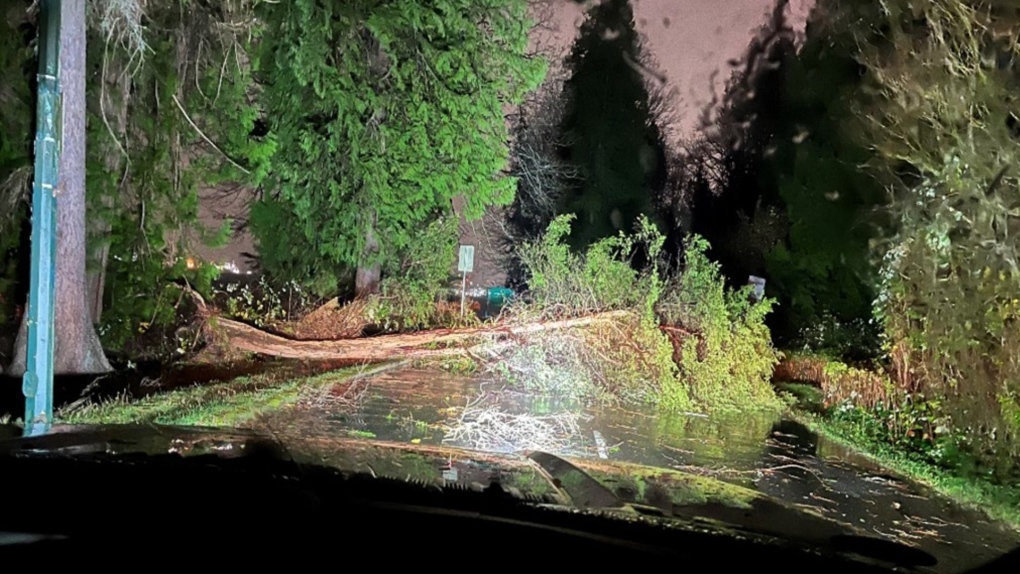'Bomb cyclone' batters B.C. coast with hurricane-force winds, downing trees onto roads and vehicles
Massive trees toppled onto roads, power lines and parked cars as hurricane-force winds battered the B.C. coast during an intense “bomb cyclone” weather event.
At its peak, the massive storm caused power outages affecting some 270,000 homes and businesses across the province, and forced the closure of several highways and roads.
- Sign up for breaking news alerts from CTV News, right at your fingertips
- The information you need to know, sent directly to you: Download the CTV News App
South of the border, a woman died after a tree toppled onto a homeless encampment in the community of Lynnwood, Wash.
Videos and images posted to social media show tree trunks and other debris littering roads on Vancouver Island and the Lower Mainland, including along the Stanley Park Causeway connecting Vancouver with the North Shore.
At least one tree also fell onto a home overnight, crashing into a family’s living room in Port Coquitlam.
Neighbour Joe Cote, whose house was struck by the same tree, said it sounded like a “bomb went off,” but no one was hurt.
“The mom and daughter were home at the time, they were pretty scared,” he said. “I saw the damage, it was just unbelievable.”
Cote said he’s been living in the area for decades, and that the intensity of these weather events has worsened, leaving him concerned that his home could be next.
“I was watching the trees, they must have moved three feet, just swaying back and forth,” he said, adding that he’s raised concerns about them to the city in the past. “We pay our taxes, let’s get some things done. We’re not going to wait for the next nightmare.”
 A downed tree is seen on Stanley Park Drive following a bomb cyclone on Nov. 20, 2024.
A downed tree is seen on Stanley Park Drive following a bomb cyclone on Nov. 20, 2024.
Environment and Climate Change Canada said winds exceeded 100 km/h in many areas, with remote Sartine Island, off the northern tip of Vancouver Island, enduring gusts of 170 km/h – the equivalent of a Category 2 hurricane.
The impacts of the bomb cyclone – a phenomenon caused by rapidly dropping atmospheric pressure at the centre of a weather system – continued on Wednesday as well.
Dozens of ferry sailings were cancelled before noon, including on major routes between Vancouver Island, the Lower Mainland and the Gulf Islands.
BC Ferries encourages travellers to check for service disruptions online before heading to a terminal.
Nearly 100,000 properties remained without electricity on Wednesday morning, the vast majority on Vancouver Island. BC Hydro said crews worked throughout the night to restore service, but were hindered by the fallen trees and debris.
In a statement, spokesperson Moira Scott said the wind was also “too strong overnight to complete the work safely” in some areas.
By Tuesday night, the storm had already forced the closure of a number of highways on Vancouver Island, including multiple stretches of Highway 4.
The key route was reopened between Port Alberni and Tofino on Wednesday morning, but remained closed between Qualicum Beach and Port Alberni, with no detour available.
DriveBC said local traffic “will be allowed through between Chalet Road and Chatsworth Road” during the shutdown.
With files from The Canadian Press
CTVNews.ca Top Stories

Can the Governor General do what Pierre Poilievre is asking? This expert says no
A historically difficult week for Prime Minister Justin Trudeau and his Liberal government ended with a renewed push from Conservative Leader Pierre Poilievre to topple this government – this time in the form a letter to the Governor General.
Two U.S. Navy pilots shot down over Red Sea in apparent 'friendly fire' incident, U.S. military says
Two U.S. Navy pilots were shot down Sunday over the Red Sea in an apparent 'friendly fire' incident, the U.S military said, marking the most serious incident to threaten troops in over a year of America targeting Yemen's Houthi rebels.
Ottawa MP Mona Fortier appointed chief government whip
Ottawa-Vanier MP Mona Fortier has been appointed as chief government whip, the latest addition in a major reshuffle of Prime Minister Justin Trudeau's cabinet.
opinion Tom Mulcair: Prime Minister Justin Trudeau's train wreck of a final act
In his latest column for CTVNews.ca, former NDP leader and political analyst Tom Mulcair puts a spotlight on the 'spectacular failure' of Prime Minister Justin Trudeau's final act on the political stage.
B.C. mayor gets calls from across Canada about 'crazy' plan to recruit doctors
A British Columbia community's "out-of-the-box" plan to ease its family doctor shortage by hiring physicians as city employees is sparking interest from across Canada, says Colwood Mayor Doug Kobayashi.
Bluesky finds with growth comes growing pains - and bots
Bluesky has seen its user base soar since the U.S. presidential election, boosted by people seeking refuge from Elon Musk's X, which they view as increasingly leaning too far to the right given its owner's support of U.S. president-elect Donald Trump, or wanting an alternative to Meta's Threads and its algorithms.
'There’s no support': Domestic abuse survivor shares difficulties leaving her relationship
An Edmonton woman who tried to flee an abusive relationship ended up back where she started in part due to a lack of shelter space.
opinion King Charles' Christmas: Who's in and who's out this year?
Christmas 2024 is set to be a Christmas like no other for the Royal Family, says royal commentator Afua Hagan. King Charles III has initiated the most important and significant transformation of royal Christmas celebrations in decades.
OPP find wanted man by chance in eastern Ontario home, seize $50K worth of drugs
A wanted eastern Ontario man was found with $50,000 worth of drugs and cash on him in a home in Bancroft, Ont. on Friday morning, according to the Ontario Provincial Police (OPP).

































